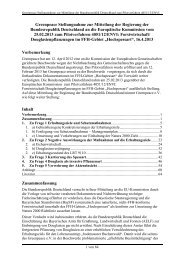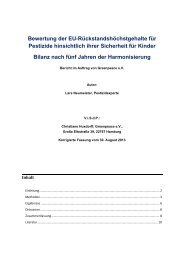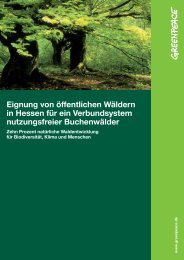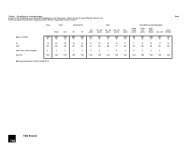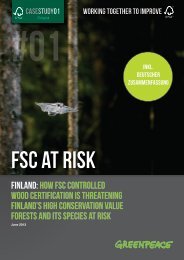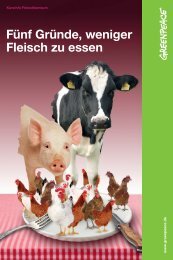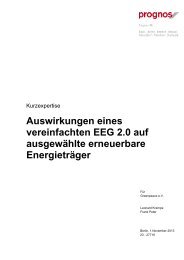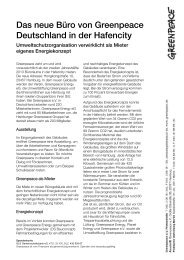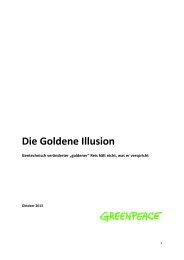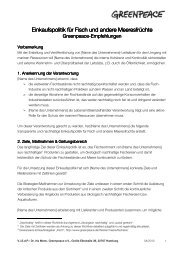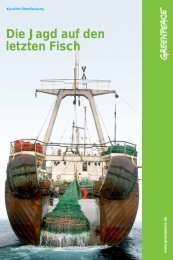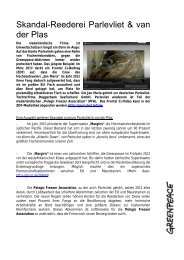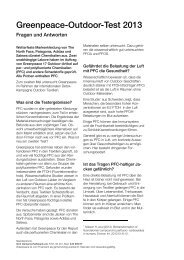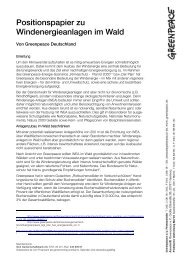Untitled - Greenpeace
Untitled - Greenpeace
Untitled - Greenpeace
You also want an ePaper? Increase the reach of your titles
YUMPU automatically turns print PDFs into web optimized ePapers that Google loves.
38<br />
CARVING UP THE CONGO<br />
©<strong>Greenpeace</strong>/Daniels<br />
‘[In the DRC] the looting that<br />
was previously conducted by<br />
the armies themselves has<br />
been replaced with organized<br />
systems of embezzlement,<br />
tax fraud, extortion, the use<br />
of stock options as kickbacks<br />
and diversion of State funds<br />
conducted by groups that<br />
closely resemble criminal<br />
organizations … The most<br />
important element in<br />
effectively halting the illegal<br />
exploitation of resources in<br />
the Democratic Republic of<br />
the Congo relates to the<br />
political will of those who<br />
support, protect and benefit<br />
from the networks.’ 192<br />
UN Security Panel, 2002<br />
The 2004 decree granting CFBC prospecting<br />
rights stipulates that logging ‘under any<br />
pretext’ is ‘strictly forbidden’ throughout the<br />
prospecting period, 193 although cutting<br />
reportedly began in the autumn of 2004. 194<br />
In March and October 2005, the company was<br />
granted two lettres d’intention near Libenge,<br />
totalling 358,000 hectares. 195 The post-May<br />
2002 signing of these logging contracts to<br />
CFBC suggests another violation of the<br />
moratorium and breach of the Forestry Code.<br />
A clear governance issue is tax avoidance by<br />
not declaring exports. One consequence of the<br />
lack of capacity in the forestry service and<br />
corruption in the DRC is that timber smuggling<br />
is rife: according to the International Crisis<br />
Group there are indications that actual timber<br />
export levels are as much as seven times<br />
higher than official figures. 196 It seems highly<br />
unlikely that export tax is paid on timber<br />
exported from the DRC where the timber has<br />
not been recorded in the official figures.<br />
CFBC is accused of exporting timber through<br />
the Central African Republic to Cameroon. 197<br />
According to a report of investigations by the<br />
Congolese human rights Les Voix des Sans-<br />
Voix (VSV), this has been carried out under<br />
escort from Bemba’s former personal guard,<br />
a detachment of the Division de protection<br />
présidentielle (DPP), without inspection at<br />
border checkpoints. 198<br />
Within three months of CFBC’s arrival in<br />
Libenge, protests by local people were met<br />
with intimidation and arrests by local<br />
authorities. 199 In April 2006, angry residents of<br />
Libenge attempted to attack the house of the<br />
CFBC managing director after the child of a<br />
company employee was killed in a traffic<br />
accident involving a CFBC log truck. 200 The<br />
manager’s house was allegedly protected by<br />
DPP guards. 201<br />
According to the report on the investigations<br />
of VSV, several of the protestors arrested and<br />
imprisoned sustained ‘inhuman’ treatment in<br />
jail, including beatings and deprivation of<br />
food. The official ‘inquiry commission’<br />
dispatched to Libenge after the incident<br />
appears to have been a retaliatory mission:<br />
police and military reportedly committed<br />
‘reprisals’ and ‘extortion’. VSV indicates that<br />
provincial authorities had previously<br />
attempted to suspend CFBC operations, but<br />
that the MLC ordered their continuation. 202<br />
As illustrated above, CFBC’s titles, totalling<br />
more than 350,000 hectares, awarded after<br />
the moratorium 203 seem to enjoy political<br />
protection. They are a real test case for the<br />
legal review. The outcome of the legal review<br />
will provide a reality check as to whether the<br />
World Bank’s strategy for reform is overcoming<br />
corruption and bringing the rule of law to the<br />
governance of the DRC’s natural resources.<br />
Timber from CFBC is imported into European<br />
countries including France, Italy and Portugal. 204<br />
THE WORLD BANK GROUP<br />
AND GERMAN GOVERNMENT<br />
FUND OLAM’S ILLEGAL<br />
LOGGING OPERATIONS<br />
Over three and half years after the<br />
moratorium was put in place, three titles<br />
totalling over 300,000 hectares were granted<br />
to a newcomer to the DRC timber industry:<br />
the multinational trading company Olam<br />
International Ltd. 205<br />
Olam’s activities include logging, timber trade<br />
and wood processing. It is expanding its<br />
global interests into countries known for<br />
conflict timber and other issues related to the<br />
illegal timber trade. It has had trading<br />
interests in Burma, 206 a country accused of<br />
gross human rights abuses. In terms of<br />
respect for governance, in June 2005, Olam<br />
Gabon was reported to owe nearly 7 million<br />
FCFA ($14,000) in forestry back taxes. 207<br />
More recently in Ghana, Olam has also been<br />
involved in large-scale fraudulent<br />
underdeclaration of its timber exports and<br />
timber from illegal sources that was sold to<br />
Olam by its suppliers. The loss in financial<br />
revenue to the state of Ghana is estimated to<br />
be several million dollars. 208<br />
In November 2003, the World Bank’s privatesector<br />
investment branch, the International<br />
Finance Corporation (IFC), invested $15 million<br />
in Olam to help it expand its global<br />
operations. 209 The IFC estimated that about<br />
5% of this investment ‘would benefit Olam’s<br />
worldwide timber operations’ of which an<br />
unspecified amount ‘will be expected to<br />
finance sawmilling in Africa’. 210



